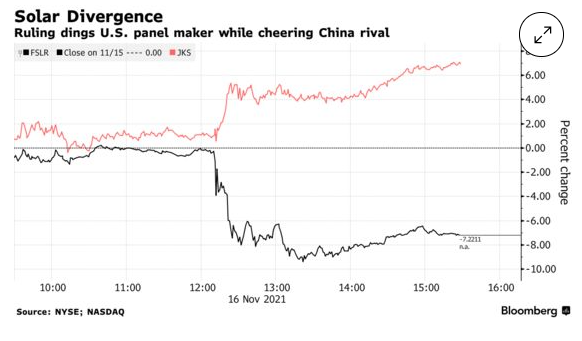United State Court Reopens Solar-Tariff Loophole That Trump Killed
- Decision indicates bifacial photovoltaic panels once more exempt from tariffs
- Ruling aids programmers yet is blow to united state makers
An U.S. trade court has actually reinstated a tariff exception on some imported solar panels, a decision that benefits domestic clean-energy programmers.
Former President Donald Trump last year removed a loophole that spared double-sided photovoltaic panels from import duties, yet that "constituted an activity outside the president's delegated authority," united state Court of International Trade Judge Gary Katzmann claimed in a ruling Tuesday.
As a result of the court's ruling, every one of the business that paid tariffs under the Trump era proclamation will obtain refunds, according to the industry trade group Solar Energy Industries Association.
The judge's ruling is the 2nd blow to domestic panel manufacturers in the past week, after the U.S. Commerce Department denied Wednesday a demand from a group of confidential suppliers to expand a separate collection of tariffs to cover equipment made in Thailand, Malaysia as well as Vietnam. Nonetheless, it will help U.S. developers that combated to recover the tariff exception on so-called bifacial solar panels.
"This is a significant surprise," Philip Shen, an analyst at Roth Capital Partners, claimed in a note Tuesday. "Just like that, module vendors can import bifi modules right into the U.S., and the industry can prevent" the tariffs Trump enforced in 2018, Longi Green Energy Technology Co., the world's leading solar supplier, slipped by 0.6% Wednesday, while Trina Solar Co. climbed 1.6% and JA Solar Technology Co. climbed up 1.3%. In New York trading on Tuesday, First Solar Inc., the biggest united state solar manufacturer, dropped 7% while China-based JinkoSolar Holding Co. obtained 7.6%.
Longi, Trina, Jinko, and also the China Photovoltaic Industry Association did not promptly respond to ask for comment.

"This is an unfavorable ruling that places domestic solar makers at risk of instant and substantial damage," claimed a representative for Hanwha Q Cells, a South Oriental manufacturer of bifacial solar modules that has a facility in Dalton, Georgia.
"This ruling doesn't aid the U.S. solar industry. We wish to support a sector, this sets it back," said Brian Lynch, head of solar organization advancement at LG Electronics United States Inc. LG's center in Huntville, Alabama, makes bifacial solar modules.
The judge's decision comes months after the trade court ruled Trump's proclamation hadn't broke an earlier order, efficiently allowing his administration to finish the exclusion. In December, a Washington-based solar-trade group and also some programmers tested the pronouncement, competing the administration "failed to comply with the called for treatments" prior to acting.
Trump initially approved 4 years of tariffs on solar devices imports, starting at 30%. The management later on shocked several in the field by approving an exclusion for bifacial panels. While they were taken into consideration specific niche items, the tariffs had actually encouraged some brand-new solar manufacturing in the united state, and module imports exempt from those duties postured a danger.
The previous president's proclamation was "an illegal attempt to harshen" his tariffs, Abigail Ross Hopper, CEO of the SEIA, stated in a statement.
The Office of the USA Trade Representative did not right away react to an ask for comment. And, the International Trade Payment has no comment to use.
The instance is Solar Energy Industries Association v. U.S., 20-3941, U.S. Court of International Trade (New York).
Also read

